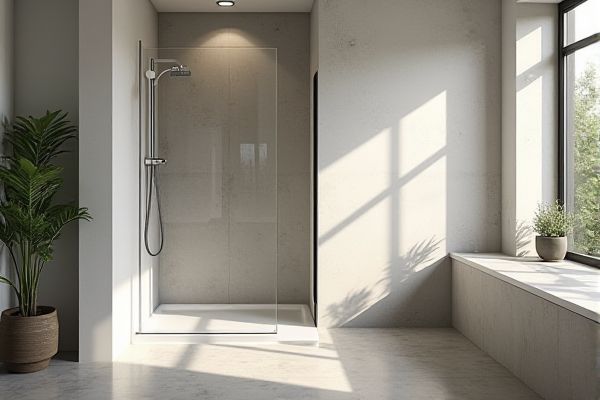
Choosing between a corner shower and a rectangular shower depends on your bathroom layout and space efficiency needs, with corner showers maximizing tight spaces and rectangular showers offering more room and versatility. Explore the detailed comparison in the rest of the article to find the best fit for your bathroom design.
Table of Comparison
| Feature | Corner Shower | Rectangular Shower |
|---|---|---|
| Space Efficiency | Ideal for small bathrooms, fits into corners | Requires more wall space, better for larger bathrooms |
| Shape & Design | Triangular or quadrant shape, rounded or angled edges | Rectangular shape with straight edges |
| Installation | Easier to install in tight or awkward spaces | Requires more planning, often involves framing walls |
| Comfort & Accessibility | More compact, may feel cramped for some users | Offers more room, easier movement inside shower |
| Water Containment | Good water containment due to corner placement | Effective water containment with proper door or curtain |
| Customization & Features | Limited customization options | More options for shower heads, benches, and storage |
| Aesthetic Appeal | Modern look, maximizes bathroom space visually | Classic and versatile design that suits many styles |
| Cost | Generally less expensive due to smaller size | Tends to be more costly with more materials and labor |
Introduction to Corner vs Rectangular Showers
Corner showers maximize bathroom space by fitting snugly into unused corners, making them ideal for small or compact areas. Rectangular showers offer a more traditional design with ample room for movement, often preferred for larger bathrooms where space allows for expansive showering. Both styles balance functionality and aesthetics, with choice depending on room size and personal preference.
Space Efficiency: Making the Most of Your Bathroom
Corner showers maximize space efficiency by fitting snugly into unused bathroom corners, freeing up floor area and allowing for more flexibility in layout. Rectangular showers, while offering more interior room for movement, often require more wall and floor space, which can limit placement options in smaller bathrooms. Choosing a corner shower is ideal for compact spaces where optimizing every inch of the bathroom is essential for functionality and comfort.
Design Aesthetics: Style and Appeal
Corner showers maximize bathroom space with a sleek, modern appeal, fitting seamlessly into small or uniquely shaped rooms. Rectangular showers offer a classic, versatile design that accommodates more movement and can feature larger glass panels for an open, luxurious look. Your choice between corner and rectangular showers impacts the overall style, influencing whether you prioritize compact elegance or expansive sophistication.
Installation Requirements and Complexity
Corner showers typically require less space and simpler plumbing adjustments, making installation quicker and more straightforward compared to rectangular showers. Rectangular showers often demand more extensive wall preparation, precise measurements, and potential modifications to existing plumbing lines, increasing complexity. Both installations benefit from professional assessment to ensure proper fit and waterproofing.
Accessibility and User Experience
Corner showers maximize bathroom space by providing easy access from multiple angles, making them ideal for compact or irregularly shaped rooms. Rectangular showers offer more interior space, enhancing comfort and movement, which benefits users requiring extra room for seating or mobility aids. Both designs can incorporate features like sliding doors or low thresholds to improve accessibility and overall user experience.
Cost Comparison: Budget Considerations
Corner showers generally offer a more budget-friendly option due to their smaller size and simpler installation, reducing material and labor costs. Rectangular showers often require more space and additional plumbing adjustments, increasing overall expenses. Homeowners aiming for cost efficiency typically prefer corner showers for smaller bathrooms and tighter budgets.
Maintenance and Cleaning Differences
Corner showers typically feature fewer seams and smaller glass panels, which reduces areas where soap scum and mold can accumulate, making maintenance easier compared to rectangular showers. Rectangular showers often have larger surfaces and more grout lines that require regular scrubbing and sealing to prevent mildew growth. Choosing a corner shower can minimize cleaning time while maintaining hygiene due to its compact design and simpler layout.
Customization Options for Each Style
Corner showers offer compact design flexibility, ideal for maximizing space in small bathrooms, with customizable glass styles, door configurations, and tiled wall layouts. Rectangular showers provide broader customization possibilities, allowing for expansive layouts, built-in benches, and dual showerheads, enhancing luxury and functionality. Your choice depends on available space and desired features, ensuring a tailored shower experience.
Best Fit for Small and Large Bathrooms
Corner showers maximize space efficiency, making them ideal for small bathrooms by fitting snugly into unused corners and freeing up floor area. Rectangular showers offer a spacious design that suits large bathrooms, providing ample room for movement and additional features like benches or dual showerheads. Your choice depends on bathroom size and layout, with corner showers optimizing compact spaces and rectangular showers enhancing comfort in larger areas.
Final Verdict: Which Shower Type Suits You Best?
Choosing between a corner shower and a rectangular shower depends on your bathroom layout and space efficiency needs. Corner showers maximize smaller spaces and add a modern touch, while rectangular showers offer more room for comfort and versatile design options. Consider your daily habits and bathroom size to decide which shower type enhances your routine and fits your lifestyle best.
 homyna.com
homyna.com